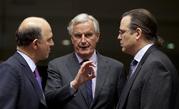Greece to get two more years but delay to bailout
EU talks on banking union to expose divisions
|
BRUSSELS (AP) -- Shoring up Europe's banking sector and strengthening oversight of economic policies topped the agenda of a meeting Tuesday of the European Union's 27 finance ministers that was expected to expose divisions among the continent's powers.
Weakness in the banking sector and inadequate monitoring of national budgets were prime causes of Europe's three-year financial crisis. Fixing those areas is crucial not only to ending the current crisis but also preventing a repeat.
The Cypriot finance minister, Vassos Shiarly, who was chairing the meeting, called Tuesday's "a very challenging agenda."
The officials were discussing the setup of an EU banking union overseen by a single supervisor, as well as increasing capital requirements for banks. They were also were debating the sensitive topic of how to more closely monitor the draft budgets of EU members and correct excessive deficits.
The discussions, however, were expected to be contentious and highlight once again the difference in views among Europe's biggest powers on fundamental issues. Britain, France and Germany disagree on how to oversee their banking sectors. On Monday, ministers from the 17 countries that use the euro failed to agree on how to put Greece's bailout program back on track.
The discussions come at a time when European leaders think they are at long last beginning to emerge from the financial crisis, with market turmoil subsiding in recent months.
"The worst is behind us, although we can't be entirely certain," Italian Premier Mario Monti said Tuesday in an interview with French radio station Europe 1.
But while financial markets may have improved, the economy is in a poor state, and deteriorating.
Monti warned that European leaders need to act quickly to spur growth, the key ingredient that has been lacking in much of the continent as it tries to get its finances back in balance.
Official figures due later this week are expected to show the eurozone fell into recession - technically defined as two consecutive quarters of economic contraction - in the third quarter. Even Germany, the continent's largest economy, is slowing, as was evident in an unexpected drop in the ZEW survey of investor confidence on Tuesday.
Another unresolved issue in Europe's crisis is how to get Greece's public debt down so the country can eventually survive without bailout loans.
On Monday, the eurozone finance ministers failed to approve a new installment of bailout money for Greece. The discussion faltered over a disagreement between the EU and the International Monetary Fund - two of Greece's three creditors - on the timeline for bringing Greece's debts down to a manageable level. The European Commission, the EU's executive arm, wants to give Greece until 2022 to reduce its debt to 120 percent of gross domestic product; but the IMF wants to stick to the original deadline of 2020.
Eurozone officials will hold another meeting Nov. 20 to hash out a compromise, which must come before Greece gets its next batch of loans. French Finance Minister Pierre Moscovici said they would hand Greece its next loan installment, worth (EURO)31.5 billion ($40 billion), by the end of the month.
The meeting did agree to give Greece until 2016 - that is, two more years - to make the reforms necessary to right its economy and begin reducing its debts. But Greece's creditors still have to decide how they will pay for the extension; officials have said it will cost about (EURO)30 billion extra through 2016.
German Finance Minister Wolfgang Schaeuble said Tuesday morning that Greece's lenders wouldn't necessarily have to fork over more cash to plug the hole. He suggested that it could be filled by lowering the interest rates of the loans. He ruled out, however, asking eurozone countries to accept losses on their loans - as some have suggested might be necessary to reduce Greece's debt burden.
Greece has had to raise money from financial markets to be able to repay (EURO)5 billion in bonds maturing Friday. It managed to get (EURO)4.06 billion from the sale of short-term bills on Tuesday. It will accept more bids until Thursday, by which time it expects to have gathered enough to afford Friday's bond repayment.
On Monday, eurozone finance ministers also discussed the plan to restore the capital levels of Spanish banks, saying it was proceeding well. On Tuesday, Luis De Guindos, the Spanish economy minister, echoed that analysis.
"In early December, we will do the recapitalization of Spanish bank system and everything goes as we established," he said.
He added that the so-called "bad bank," a fund that would buy up soured investments from banks at a discount, would be established Dec. 1. The hope is that Spanish banks will lend more once those bad investments are no longer on their books.
---
Don Melvin can be reached at http://twitter.com/Don-Melvin . Sarah DiLorenzo can be reached at http://twitter.com/sdilorenzo .
© 2012 The Associated Press. All rights reserved
http://rationalreview.news-digests.com/archives/105819
